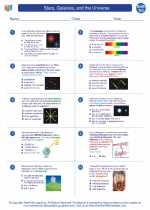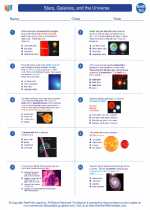Phenomena in Earth Science
Phenomena in Earth Science refer to natural events or occurrences that can be observed and studied. These phenomena can range from geological processes to atmospheric events, and they play a crucial role in shaping the Earth's landscape and environment.
Types of Phenomena
There are various types of phenomena in Earth Science:
- Geological Phenomena: These include volcanic eruptions, earthquakes, landslides, and erosion.
- Atmospheric Phenomena: Such as hurricanes, tornadoes, thunderstorms, and various cloud formations.
- Hydrological Phenomena: These encompass phenomena related to water, such as floods, river erosion, and the formation of various landforms by water.
- Biological Phenomena: This category includes natural processes such as plant growth, animal migrations, and ecological interactions.
Studying Phenomena
Studying phenomena in Earth Science involves careful observation, data collection, and analysis. Here are the key steps to effectively study phenomena:
- Observation: Start by observing the phenomenon and noting down its key characteristics, such as location, timing, and any associated environmental factors.
- Data Collection: Gather relevant data using tools such as seismographs, weather instruments, or remote sensing technologies.
- Hypothesis Formation: Develop a hypothesis to explain the observed phenomenon based on the collected data and existing scientific knowledge.
- Experimentation: Conduct experiments or simulations to test the proposed hypothesis and gather further evidence.
- Analysis: Analyze the data collected from experiments and observations to draw conclusions about the phenomenon and its underlying processes.
- Communication: Communicate the findings through scientific reports, presentations, or publications to contribute to the collective understanding of Earth Science phenomena.
Example Phenomenon: The Rock Cycle
An example of a phenomenon in Earth Science is the rock cycle, which describes the processes through which rocks are formed, altered, and recycled over time. The rock cycle involves various geological phenomena such as igneous rock formation from magma, sedimentary rock formation through compaction and cementation, and metamorphic rock formation through heat and pressure.
Studying the rock cycle involves understanding the interactions between geological processes, the properties of different rock types, and the influence of external factors such as erosion and tectonic movements.
By understanding phenomena like the rock cycle, scientists can gain insights into the Earth's history, composition, and ongoing geological changes, contributing to our understanding of the planet's dynamic nature.
[Phenomena] Related Worksheets and Study Guides:
.◂Earth Science Worksheets and Study Guides High School. Stars, Galaxies, and the Universe

 Worksheet/Answer key
Worksheet/Answer key
 Worksheet/Answer key
Worksheet/Answer key
 Worksheet/Answer key
Worksheet/Answer key
